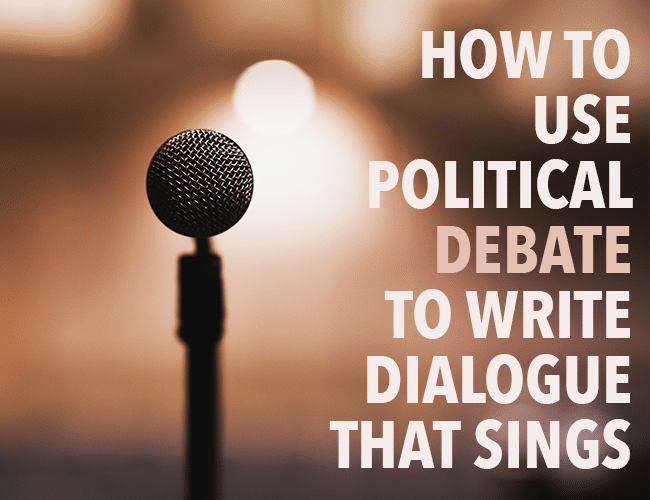If you live in the United States, there is a good chance your television was tuned in to the presidential debate on Sunday night.

Regardless of your politics, the conversation likely brought a cocktail of anxiety and frustration mixed with joy and elation. At one second you felt the warmth brought by the anticipation of victory and then, suddenly, the dull pain of possible defeat.
As writers, these are the emotions we want readers to experience when they engage with our stories. We want them to become as emotionally invested as they do in a political debate.
Today, rather than focusing on who won or lost the actual debate, let’s use what we watched as inspiration for our writing.
4 Debate Tricks That Reveal Character
The setting of a political debate provides a wonderful opportunity for us to practice our dialogue writing. Without having to build a setting or provide backstory to characters, we reveal aspects of our characters' personalities and who they are through their words and body language.
The debate stage is an opportunity for us to create contrasting characters and then place a spotlight on their differing features. A debate is a moment for our honest and compassionate characters to shine while our insincere and shady characters show their true colors.
Part of what makes a debate such a rich scene is that the character revelations go beyond the words. It isn’t just the content of what the candidates say that reveals their true feelings: the way they play the game gives us insight into who they are.
When real-life correspondents analyze a debate, they look at the whole package the candidate brought to the event: the facial expressions, the tone of voice, the preparedness or lack thereof. And candidates know this, so they use tricks to manipulate us relate into relating to and empathizing with them.
Here are four tricks commonly used in debates that we should let our characters use in dialogue:
1. Compliment the Question
Complimenting the moderator's question is a common trick used for multiple reasons.
First, for the audience it builds a sense of rapport between the moderator and the candidate. The candidate appears appreciative of the moderator's hard work in forming and providing the questions.
It also makes the candidate appear confident. It doesn't matter how difficult the question is—by complimenting it the candidate appears unruffled and in total control.
Finally, complimenting the question is a stall tactic that allows the candidate to gather their thoughts before speaking.
When we knowing this trope is a common part of political discourse, we can play with it in humorous ways, providing levity to the dialogue and potential insight into our characters. For example:
“Candidate Clovis,” the moderator said into the microphone. The gravity of his voice brought a knowing hush over the crowd as the audience anticipated the bomb of a question that was about to be unleashed. “Some have said,” the moderator continued, “that you are ill-equipped to be our mayor as you have never held political office, only have a high school level education, and, in fact, have spent the last five years working as a birthday party clown. Is that true, sir?”
“Mr. Moderator,” Clovis said with a charming smile. “I am so happy you asked that question. And you know, it is true that I've never served in political office. But as you point out, I'm used to dealing with clowns, which I believe makes me the perfect fit for city hall.”
2. Talk Around the Question
Anyone who’s watched a debate knows this trick. Regardless of what the moderator asks, the candidate will reference the question in a general way and then answer the question they wished they’d asked.
Through this trick, we learn what is important to our characters. Readers will see where the character wants the conversation to go, which reveals something about the character's intentions.
Skillful debaters wrap us so deeply in their redirecting stories that, by the time they are done, we’ve forgotten what the original question was.
“Please tell us, Candidate Clovis, how you feel about the price of tomatoes,” the moderator asked.
“Well, Mr. Moderator, I’m so glad you asked,” Clovis said, pausing to take a drink of water. “You see, tomatoes are important to me. In fact, all fruit is important to me. Did you know that I grew up on a fruit farm? And it was on that farm that I learned the value of hard work. Hard work and discipline. Let me tell you my granddad taught me about hard work and discipline. My grandfather said that . . .”
3. Provide a Random Example from Everyday Life
This is a technique I feel is used more with each debate I watch. It occurs when a candidate references a private conversation they’ve had with an everyday citizen.
It’s intended to make the audience feel like the candidate understands and empathizes with the problems of ordinary people.
“Mr. Clovis, would you mind explaining to us how you would bring relief to the current downturn in wages?”
“That is a fantastic question, Mr. Moderator,” Clovis said, loosing his tie. “Why, just yesterday I was in the diner on 3rd street, where I had coffee with a sweet, elderly lady named Mrs. Cershaw. Now Mrs. Cershaw has worked in the diner for twenty-four years, every day taking care of her customers with a smile. And you know what she told me? She told me all about how she couldn’t afford her favorite cookies anymore because the prices in her grocery store are skyrocketing up beyond what the small tips she receives every day can bear.”
4. Use a Folksy Metaphor
Having grown up in the South, this is one of my favorite techniques to write. The sillier and more absurd the metaphor, the more fun I find it to read.
“You know, Mr. Moderator, you can’t catch a coon in the rain when your dog has a cold,” Clovis said, flashing a grin to the camera.
“While I appreciate my opponent’s attempt to explain this complicated issue,” Clovis laughed, “it doesn’t matter how much red paint you slop on a barn; it still just looks red.”
Clovis wagged his finger at his opponent as he said, “That strategy is like a pickup truck with bucket seats where the bed should be. Not only does it look weird, but it ain’t going to haul any apples and the orchard's going to rot.”
Telling Strategies Beyond the Debate Stage
Use the setting of a debate and play with rhetorical tricks to write fun scenes with vibrant characters. These tricks will also stretch far beyond the debate stage—try applying them to your characters' everyday conversations for some entertaining interactions and telling displays of personality.
Have I missed anything? What other tricks have you noticed debaters using? Let me know in the comments.
PRACTICE
Take fifteen minutes to write a debate between two characters running for office.
Don’t worry about the scenery or the audience; focus instead on the questions asked and how your characters answer. Describe their body language and tone of voice. Reveal to us who your characters are by their tricks and words and the choices they make.
When your time is up, post your practice in the comments, and leave some feedback for your fellow writers!







“Senator Johnson, how would you solve the drug epidemic, sweeping through our inner cities across the country?”
Johnson stepped forward eagerly with the mic to his lips. “Well first, that’s a great question Eliza. As you may know, I’ve worked with troubled, inner city, youth, during my time as a counselor at Harmen High School for many years. I’ve seen what drugs can do to people who live in these inner city communities, and it’s saddening honestly. The war on drugs is a complete disaster–lets just be honest, it’s a complete failure. We’ve failed our inner city youth. I’ve had parents dragging children, as young as 14, into my office for this exact problem, and I’ve seen the dark side. I’ve seem families torn apart.”
He paused with the mic still at his mouth. His eyes were still like he was remembering something horrific.
“Senator Johnson?” Eliza said, “are you okay?”
“The worst part Eliza,” Johnson continued. “The worst part had to be attending the funeral of one of the students.His name was Thomas Sheppard. He overdosed on heroine…”
You can hear the shock of the crowd and mumbling too. Then you could hear Johnson’s sniffles. He let the long overdue tears cascade down his face, and he didn’t wipe them away. Although they were real, he knew those tears would get him more voters. He was such a politician.
“Do you need a break sir?–” Eliza asked
“No listen this is what we do,” Johnson started again. “We know where the drugs are coming from. We know South America is the big supplier. We need to control our borders again. BUT we also need to pay attention to our waters. Most of the drugs we see in america today, our coming in on container ships, non-commerical vessles, and fishing boats. So the plan is to watch these things very carefully, and take back our control. Anothee thing, police spend so much wasted time on low-level druga offenses like marijuana. The federal government should focus more on large cases that cross international and state boundaries.”
The crowd applauded.
Irvin,
Thanks for this example. I am about to take my fifteen minute spin around the debate floor. Your post has helped me develop a strategy for the task at hand. BY the way, your choice of topic is quite timely I would say.
Thank you! Glad I could help!
Great piece. Flowed nicely.
Interesting take. I’m a third-party type of guy, so with no dog in this pony show, I’ve been watching the Trump/Hillary debates the same way I’d watch a movie (or pro-wrestling match). There’s a great character arc to be written about both candidates, and it’ll be interesting to see how things turn out.
How about a dialogue between an imaginary underdog third party candidate and one or even two major candidates? That would be great fiction.
The moderator’s face came to life as if a switch had suddenly been turned on. The voice of her producer whispered in her headset, “go ahead with question number three.”
With what sounded to be genuine interest, the moderator began, “Mr. Whiteside, you have repeatedly suggested that the key to our future is more government spending for just about every line item in the current budget. With the national debt exceeding $19.5 trillion, just how do you justify more spending and more borrowing?”
“Agatha, may I call you Agatha, you ask the central question for this season of debate.” Whiteside rose from his seat exuding some privately held sense of confidence as he proceeded to walk towards the moderator’s table. He stood firm, stood tall, stood as proudly as any former US Marine might present himself.
“The key isn’t how much money we spend, but on how we honor our country’s various spending priorities. Who could object to additional funds for our military, for our schools, for our failing infrastructure, or who would object to additional funding to assist those least able to provide for themselves?” With each question, the volume and intensity of Whiteside’s voice grew. Slowly, and with sense or purpose, he turned towards his opponent, who at that unfortunate moment was caught by the camera, slumped in his chair, almost seeming to be asleep or at least severely disinterested in what was transpiring.
“My worthy opponent from the great state of Hawaii seems uninterested in the plight of our nation’s people and in the issues that demand sensible and well thought out responses. Senator Greenway, just how do you expect anyone to believe that you have their interests at heart, when all you do is shout into the wind, cut the spending, balance the budget, live within our means?” Abruptly Whiteside sat down. He glared at his opponent, silently challenging him to offer an opinion.
Senator Greenway rose to to his feet. He seemed to be taller than he looked just minutes ago. He buttoned the middle button on his suitcoat, ran his hand through his bright blond hair and began, “it appears Mr. Whiteside needs some time to concoct an answer to your question, Miss Winchell. I assume by his retreating to his corner, Mr. Whiteside expects some response from me.” You could sense the tension boiling up between these two opponents. Their quarrel, now made very public, had begun many years before they ever took the stage tonight.
The change in the mood on stage was immediate. Senator Greenway cleared his throat, walked to the edge of the stage and spoke directly to the assembled crowd. “Ladies and gentlemen, unless we find the courage to make some very difficult decisions concerning our spending, our debt will become a millstone around our necks that will cause us to drown in a sea of red ink. We can no longer put off responding to the challenges ahead of us. Next year, the proposed budget will add $6.5 trillion dollars to our debt. This is entirely unacceptable.” Senator Greenway moved to his right and focused straight ahead.
“There isn’t one person here tonight who does not understand the basic facts of economics – we cannot borrow what we cannot repay. And quite frankly, we have no way to pay down our debt, or to be even more candid, we have no way to pay back the interest on our debt without robbing funds from programs vital to the priorities of our government. Tonight, let’s get at the hard work at hand and talk honestly concerning what has to be sacrificed for our great country to move on.”
Greenway continued, “Oh, one last thing to consider – to whom does the United States owe almost $20 trillion and what if our creditors ask for their loans to be repaid? Mr. Whiteside, stand up and speak.”
The scene flows perfectly. I couldn’t stop reading until the end. Great job!
Thanks. This was kind of fun. Jon
Great scene Jonathan. I loved the between dialog body language. Nice job.
Thanks Jeff
I like debating on blogs, websites, etc. They are fun to express your opinions. Thank you for this article.